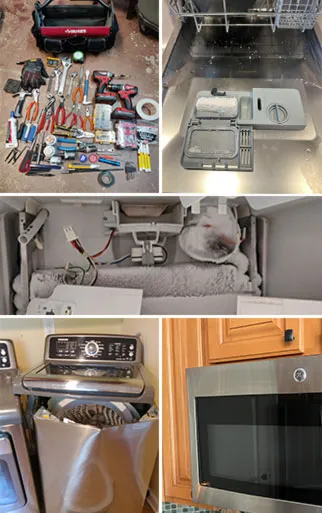
Why Washing Machines Get Dirty and Smelly and how to clean them
Washing machines are essential appliances that help us keep our clothes clean and fresh. However, over time, they can develop unpleasant odors and accumulate dirt, grime, and mold. Several factors contribute to this buildup, such as:
-
Residue from Detergent and Fabric Softeners: The excessive use of detergent and fabric softeners can leave behind residue on the drum and other parts of the machine, promoting the growth of bacteria and mold.
-
Moisture and Humidity: The moist environment inside the washing machine, combined with the humidity in the laundry area, creates an ideal breeding ground for mold and mildew.
-
Lack of Ventilation: If the washing machine is in a poorly ventilated area, it can trap moisture, leading to a musty odor and the formation of mold.
-
Neglected Maintenance: Regular cleaning and maintenance of the washing machine are crucial to prevent dirt and odors from building up. Neglecting this aspect can contribute to the machine's unpleasant smell.
How to Clean a Washing Machine
Cleaning a dirty and smelly washing machine is not a complicated task. By following a few simple steps, you can restore its freshness and efficiency. Here's how:
- Gather the Necessary Tools and Materials: Before you begin cleaning, gather the following items:
- A clean cloth or sponge
- White vinegar
- Baking soda
- Mild dish soap
- An old toothbrush
- Hot water
-
Clean the Exterior: Start by wiping the exterior surfaces of the washing machine with a cloth or sponge soaked in a mixture of mild dish soap and warm water. Pay attention to areas prone to splashes and spills, such as the control panel and door.
-
Clean the Detergent Dispenser and Filter: Remove the detergent dispenser tray and soak it in warm water mixed with mild dish soap. Scrub away any residue using an old toothbrush. Rinse it thoroughly and let it dry before placing it back.
-
Run a Cleaning Cycle: Set your washing machine to the highest water level and hottest water setting. Add two cups of white vinegar to the drum and let the machine run a complete cycle without any clothes. Vinegar helps remove odors and dissolve mineral deposits.
-
Remove Mold and Mildew: After the vinegar cycle, sprinkle a cup of baking soda into the drum. Run another cycle on the hottest setting. Baking soda is effective in eliminating stubborn odors and cleaning the interior.
-
Clean the Rubber Door Seal: The rubber seal around the door can harbor mold and mildew. Mix equal parts of water and white vinegar, dip a clean cloth or sponge into the solution, and thoroughly wipe the seal. Use an old toothbrush dipped in the vinegar solution to scrub away any stubborn mold or mildew.
-
Wipe Down the Drum: Once the cleaning cycles are complete, use a clean cloth or sponge to wipe down the drum, removing any remaining residue or cleaning agents.
Maintaining a Clean Washing Machine
To prevent your washing machine from becoming dirty and smelly again, follow these maintenance tips:
- Use the appropriate amount of detergent and fabric softener to avoid excessive buildup.
- Leave the door or lid open after each wash to allow air circulation and drying.
- Regularly clean the detergent dispenser tray and rubber door seal to prevent mold growth.
- Run a cleaning cycle with vinegar and baking soda every few months to maintain freshness.
- Consider using washing machine cleaning tablets or powders specifically designed to remove dirt and odors.
By following these simple steps and adopting regular maintenance practices, you can keep your washing machine clean, fresh, and odor-free, ensuring your clothes come out as clean and pleasant as possible.


